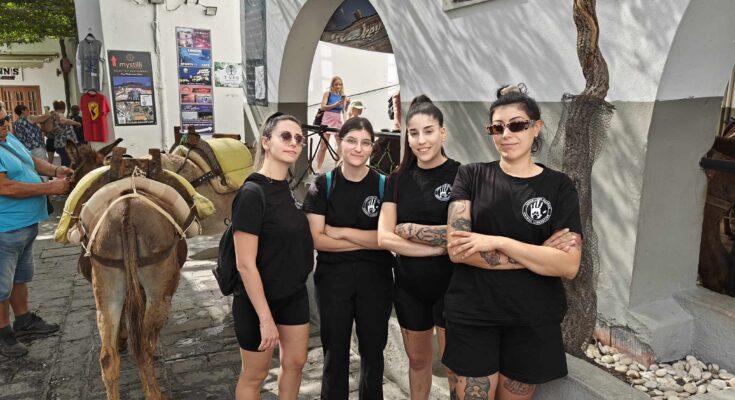The welfare of the donkeys of Lindos on the island of Rhodes has been the focus of a group of Greek volunteers who devote their time to making sure that the animals are not mistreated.
Dozens of donkeys are transporting tourists up to the Acropolis of Lindos, the main archeological site of Rhodes, located on a 116-metre-high cliff dominating the town and overlooking the sea.
Called Liber Life Rhodes, the volunteers raise public awareness for the welfare of the “Lindos-taxis” as the working donkeys are known, and they report abuses by unscrupulous owners.
“When we started two years ago we were treated with some derision by the owners. The donkeys lacked clear water and shade and they were working punishing hours transporting the tourists. However, we managed over time to build bridges and the conditions have improved,” Alexandra Passaro, a volunteer told Greek Reporter.
She points out that the improvements are not enough. “Some owners do not use scales to measure the weight of the riders. The law says that donkeys can carry up to 90 kilos (198 pounds), which is 20 percent of the animal’s weight. However, this does not always happen,” she adds providing Greek Reporter with photos that show overweight tourists riding the donkeys.

In one case she said the group took a picture of two riders on a donkey.
Passaro admits that she would like to see the end of this practice on the Greek island because as she says “This is not working, but suffering for the animals.” She concedes that it would be difficult to stop it, but hopes that in cooperation with the owners’ association, the lives of donkeys will at least improve.
The donkeys of Lindos see cuts in working hours
President of the Lindos Donkey Association, Filippos Koliais, disputes the accusations. He told Greek Reporter that there were some cases where overweight tourists rode the donkey but they were punished by a fine from the Association.
“We have installed scales to weigh the riders, but unfortunately they get stolen. We replace them all the time. We do not accept riders over 80 kilos which is less than the 90 kilos required.”
Koliais said that in the past there was a good relationship with Liber Life Rhodes, but recently the relationship has broken down. “They see a perceived mistreatment and they immediately upload it on social media, requesting immediate action. I welcome their well-intended criticisms, but I cannot be everywhere at the same time.”
Koliais defends his colleagues and says that the working hours of the animals have been reduced. “In the past, the donkeys were working almost continually from morning till evening. They now work between 8 am and 1 pm and 5.30 pm to 7 pm. Each donkey does not do more than five permitted routes, 10 minutes each to the ancient Acropolis of Lindos.”
The donkeys are microchipped vaccinated and dewormed. They have a maximum working time of 60 minutes daily. They work in pairs and on alternative days, so they get time to rest at their stables between working days, he adds.
“We care about our donkeys because they are our livelihood,” Koliais says. “In rare incidents of mistreatment, we are tough. Fines and even a ban from the Association can be imposed. We encourage people to inform us of such cases on lindosdonkeys@gmail.com.”
The Association is in close contact with Animal Action Greece, an independent organization working to find practical and sustainable solutions to animal welfare problems. Experts from the organization inspected the welfare of the donkeys of Lindos recently and they will do so again later this year.

In their latest report, the organization found that the donkeys examined were mainly medium size (estimated to weigh around 200 – 270kg), and were in ideal body condition, while some were found to be overweight. No wounds or injuries were observed and none of the donkeys were found to be lame. All the harnesses and saddle packs used were examined and none were found to be inappropriate.
“Although there is supervision from members of the Lindos Donkey Association daily to check and enforce the weight limit, as well as punishment for those who do not follow the regulations, there are some less conscientious owners who continue to break the rules and escape surveillance. As a result, overweight tourists on small donkeys are still observed,” the organization noted in its report.
Nikos Pavlakidis, the Deputy Mayor in Lindos, confirmed to Greek Reporter that there have been complaints of animal abuse. He stresses however that the municipality acts immediately to address them.
“There was a recent complaint about a donkey forced to wear a muzzle tied to a short leash. The Mayor himself went to investigate and discovered that the vet had instructed the owner to put the muzzle as the donkey was aggressive.”
These types of complaints are rare he maintains, adding that the municipality is not responsible by law for the welfare of the animals. “However each time there is a complaint we investigate.”
Pavlakidis told Greek Reporter that the owners of donkeys that make the uphill journey to the Lindos castle are around 30. Each has two donkeys.
“Five years ago the number of people working the donkeys was more than 60. Most owners were aged working from the 70s and they either passed away or retired. Many of the younger generation left to work in other jobs mainly in the tourism industry.
“Working with donkeys is a social issue. Many of the owners cannot find a job somewhere else and the income they get is very important for them and their families. That’s why most of them are keen to keep the donkeys safe and healthy. They are an important asset,” Pavlakidis notes.
Related: The Donkeys and Mules that Built Greece’s Paradise in Santorini



